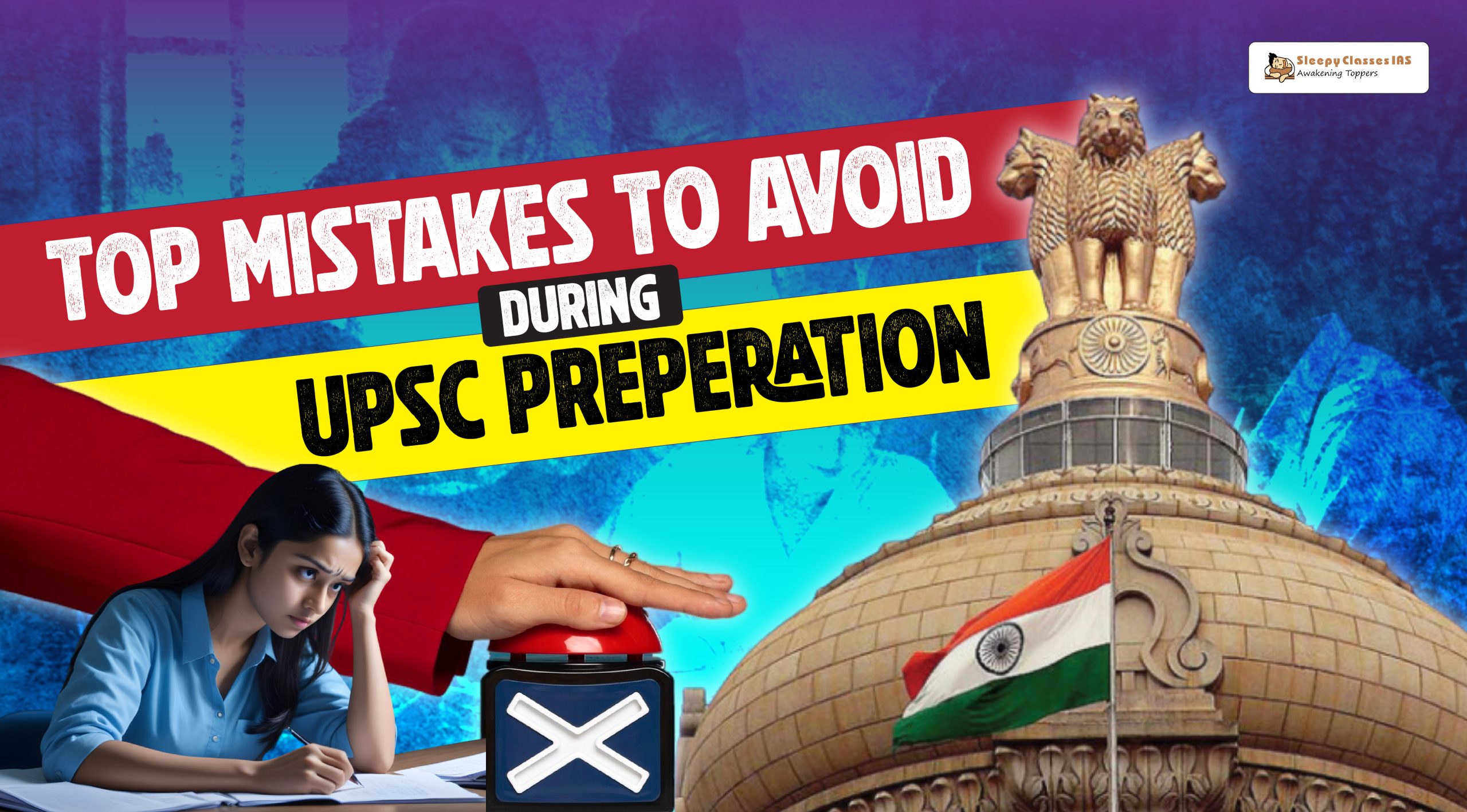
Introduction
The UPSC Civil Services Examination is one of the most challenging and competitive exams in India. Aspiring candidates often make avoidable mistakes that hinder their progress. By understanding and avoiding these common pitfalls, you can streamline your preparation and increase your chances of success. In this blog, we will explore the top mistakes to avoid during UPSC preparation and provide tips to help you stay on the right track.
1. Lack of Proper Planning
The Importance of a Study Plan
One of the biggest mistakes aspirants make is starting their preparation without a clear plan. A well-structured study plan is essential for covering the vast syllabus efficiently.
Creating a Realistic Schedule
Ensure your study plan includes daily, weekly, and monthly goals. Allocate specific time slots for each subject, revision, and practice tests. Be realistic about your daily schedule to avoid burnout.
2. Ignoring the Syllabus and Exam Pattern
Understanding the Syllabus
The UPSC syllabus is extensive and detailed. Many aspirants fail to familiarize themselves with the syllabus and end up studying irrelevant topics.
Exam Pattern Familiarity
Understanding the exam pattern, including the type of questions and marking scheme, is crucial. This knowledge helps in strategic preparation and time management during the exam.
3. Over-Reliance on Coaching Institutes
The Role of Coaching
While coaching institutes can provide valuable guidance, over-reliance on them can be detrimental. Personalized self-study is equally important.
Self-Study Importance
Dedicate time to self-study and focus on understanding concepts rather than just attending coaching classes. Supplement coaching material with your own notes and resources.
4. Not Making Personal Notes
The Value of Note-Making
Many aspirants skip making personal notes and rely solely on textbooks and coaching materials. Personal notes are crucial for quick revisions and better retention.
Effective Note-Making Techniques
Use bullet points, diagrams, and summaries to make your notes concise and easy to revise. Highlight important points and regularly update your notes with new information.
5. Ignoring NCERT Books
Foundation of Concepts
NCERT books provide a strong foundation for understanding basic concepts. Ignoring these books can lead to gaps in your knowledge.
Complementing Advanced Materials
Use NCERT books to build your basics before moving on to advanced reference books. This approach ensures a solid understanding of core topics.
6. Not Revising Regularly
The Need for Consistent Revision
Regular revision is essential to keep the vast syllabus fresh in your mind. Many aspirants make the mistake of studying new topics without revising the old ones.
Creating a Revision Schedule
Incorporate daily, weekly, and monthly revision sessions into your study plan. Use techniques like flashcards, mind maps, and quizzes to make revision engaging.
7. Ignoring Answer Writing Practice
The Art of Answer Writing
Effective answer writing is crucial for the UPSC mains exam. Ignoring answer writing practice can lead to poor performance even if you have strong knowledge of the subject.
Practicing Regularly
Join test series and practice writing answers within the time limit. Focus on clarity, coherence, and structuring your answers properly.
8. Not Analyzing Previous Years’ Papers
Understanding Trends and Patterns
Previous years’ papers provide insights into the types of questions asked, the difficulty level, and important topics. Ignoring these papers is a missed opportunity.
Incorporating Insights
Analyze previous papers to understand trends and patterns. Use this analysis to focus on important topics and practice similar questions.
9. Lack of Time Management
Balancing Preparation and Rest
Effective time management is crucial for balancing study sessions and rest. Many aspirants either overwork themselves or procrastinate, leading to inefficiency.
Creating a Balanced Schedule
Plan your day to include study sessions, breaks, and leisure activities. Stick to your schedule and adjust it as needed to ensure consistency and avoid burnout.
10. Ignoring Physical and Mental Health
The Importance of Well-being
Ignoring physical and mental health can lead to burnout, stress, and reduced efficiency. A healthy mind and body are essential for sustained preparation.
Incorporating Health Routines
Include physical activities like exercise, yoga, or sports in your daily routine. Practice meditation or mindfulness to manage stress and maintain mental well-being.
11. Not Staying Updated with Current Affairs
Relevance of Current Affairs
Current affairs play a significant role in both the Prelims and Mains exams. Many aspirants neglect this aspect, leading to poor performance.
Daily Updates and Analysis
Read newspapers, follow news websites, and use apps to stay updated with current events. Make notes on important issues and analyze their relevance to the UPSC syllabus.
FAQs
What is the most common mistake UPSC aspirants make?
The most common mistake is the lack of a proper study plan. Without a structured approach, it’s challenging to cover the extensive syllabus efficiently.
How important is note-making during UPSC preparation?
Note-making is crucial for quick revisions and better retention. Personal notes help in summarizing and recalling important points during the exam.
Can I rely solely on coaching for UPSC preparation?
While coaching provides valuable guidance, relying solely on it is not advisable. Self-study, personal notes, and consistent revision are equally important.
How can I effectively manage my time during UPSC preparation?
Create a balanced schedule that includes study sessions, breaks, and leisure activities. Stick to your plan and adjust it as needed to ensure consistency and avoid burnout.
Why is answer writing practice important for UPSC mains?
Answer writing practice is essential for presenting your knowledge effectively. It helps in structuring answers, managing time during the exam, and improving clarity and coherence.
How can I stay updated with current affairs for UPSC?
Read newspapers, follow news websites, and use apps to stay updated with current events. Make notes on important issues and analyze their relevance to the UPSC syllabus.
Conclusion
Avoiding common mistakes during UPSC preparation can significantly enhance your chances of success. By understanding the pitfalls and implementing effective strategies, you can streamline your preparation and maintain consistent progress. Remember, a well-structured study plan, regular revision, self-study, and taking care of your physical and mental health are key components of a successful UPSC preparation journey.
For more guidance and resources, explore the comprehensive offerings at Sleepy Classes.


